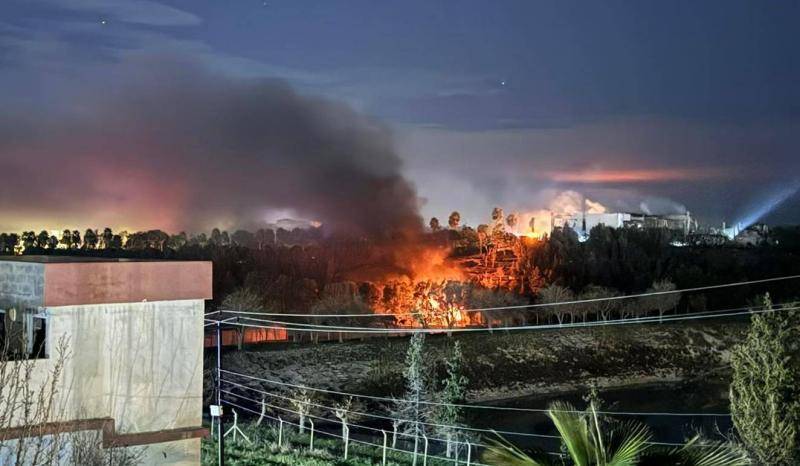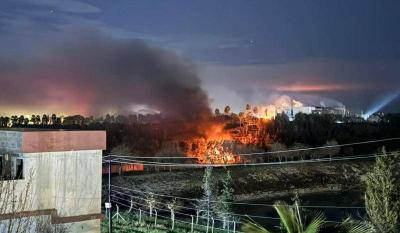This week, Iran launched missile strikes on three different countries: Iraq, Syria, and Pakistan, while armed groups supported by Tehran continued to target American and Western interests and engage in combat with Israel. This has heightened fears that the conflict could engulf the Middle East and extend to other regions.
**Why did Iran carry out attacks on Pakistan, Iraq, and Syria?**
Iran's attacks on Iraq, Syria, and Pakistan were in response to assaults on its territory or Iranian targets. On Tuesday, Iran reported that it had fired missiles at ISIS militants in Syria in retaliation for a bombing that killed dozens during the commemoration of Qassem Soleimani, the former commander of the Quds Force of the Iranian Revolutionary Guard, in central Iran on January 3rd. Soleimani oversaw a network of Iranian-allied armed factions in the region and was killed in a drone strike in 2020.
On the same day, Iran bombarded what it described as Israeli espionage sites in Iraq, which Baghdad denied. Israel had killed prominent members of the Iran-allied Hezbollah in Lebanon and members of the Revolutionary Guard in Lebanon and Syria.
In Pakistan, Iranian state media reported that Tehran destroyed two bases of Baluch militants from Jaish al-Adl, who claimed responsibility for an attack that resulted in the deaths of Iranian security personnel. On Thursday, Pakistan launched strikes against separatist militants inside Iran in response to Iran's attacks.
**Where are Iran and its proxies active?**
Under Soleimani's supervision, Iran established a network of allied armed factions in several Arab countries, strengthening these factions in the years following the US invasion of Iraq in 2003. Iran denies directly orchestrating the attacks carried out by its proxies, stating that they act independently, while expressing broad support for their anti-Israel and US movements.
Iran arms and trains groups active in the following areas:
- **Gaza Strip:** Iran supports Hamas and the Islamic Jihad Movement. Hamas, which governs the Palestinian territory, launched the attack on Israel on October 7, igniting the current war in the Middle East. Tehran positions itself as a supporter of Palestinian resistance against the Israeli occupation.
- **Iraq:** Iran has supported Shia militants in Iraq during the US occupation and maintains those ties. Armed groups with combat experience loyal to Tehran and closely connected to the Revolutionary Guard dominate the Popular Mobilization Forces (PMF), which comprises 150,000 personnel and operates under state auspices. The PMF has launched missile attacks on American bases in dozens of incidents in Iraq and Syria, prompting Washington to respond with airstrikes, including one that killed a commander in Baghdad.
- **Syria:** Syria serves as a key transit route for Iranian-allied factions between Iraq and Lebanon. Since the outbreak of the Syrian civil war in 2011, Tehran intervened to support President Bashar al-Assad, sending Revolutionary Guard advisors and fighters from Iraq, Pakistan, and Afghanistan. Hezbollah fought alongside these groups to support Assad, who remains in power.
- **Lebanon:** Hezbollah is the most loyal Iranian ally. Formed in the 1980s to fight Israeli forces in Lebanon, it boasts a stockpile of tens of thousands of missiles and includes well-trained fighters who have engaged in combat with Sunni militants in Syria for years. Hezbollah conducts daily attacks on Israeli forces along the Lebanese-Israeli border.
- **Yemen:** The Iran-aligned Houthi group has controlled large swathes of Yemen since 2014 and has fought against a Saudi-backed coalition for dominance in the war-torn country. Tehran was among the first to support the Houthis in their fight against Riyadh, its arch-rival. The Houthis, officially known as Ansar Allah, are currently launching missiles at Israel and commercial vessels in the Red Sea, while the US targets Houthi positions in Yemen.
**Are the attacks related to the Israel-Gaza war?**
The Iran-backed "Axis of Resistance" claims that its coordinated actions are responses to Israel's bombing of Gaza and its ground invasion of the territory. The Houthis, Hezbollah, and other groups have indicated they would cease their attacks if Israel stops its offensive against the Palestinians.
**Do they share the same goals?**
Iran and its proxies share the goal of halting Israeli bombardment of Gaza and expelling US forces from the region permanently. However, they also have their own local interests. Hezbollah, as the most influential group in Lebanon, seeks to avoid escalating the conflict or intense military operations by Israel, which could threaten its status in Lebanon. Analysts note that the Houthis aim to regain control in Yemen and are leveraging the ongoing war to assert their military strength and regional importance. However, the precise extent of Iran's control over Houthi actions is contested.
In contrast, the PMF has gained wealth through dominating significant parts of the state and economy. While the factions most loyal to Iran follow Tehran's orders, other groups seek money and influence, believing that regional turmoil could undermine their dominance in Iraq, according to some officials.
**What is happening within Iran?**
Protests swept across Iran in 2022 and 2023, prompting the government to launch a violent crackdown. These protests represented one of the most significant challenges to Iran's Shia rulers since the Islamic Revolution of 1979, which brought them to power. Tehran continues to suppress dissent within the country but faced a shock this month with the attack during the commemoration of Soleimani, for which ISIS claimed responsibility. The attacks from the Sunni militant group Jaish al-Adl have led many Iranians to question their government’s ability to ensure their security.
**Is Russia involved in the conflict?**
In recent years, the rapprochement between Russia and Iran has increased, as both share the international isolation imposed by US sanctions and oppose US global influence. Tehran provides Moscow with drones used in its attacks on Ukrainian cities. Both countries intervened in Syria to rescue their common ally, Bashar al-Assad, and Russia has expressed concern over the clashes between Iran and Pakistan, urging both Tehran and Islamabad to resolve their differences through diplomatic efforts.
**Will the situation escalate?**
Estimates from Western and regional officials and analysts suggest that Iran wishes to avoid any direct military confrontation with the US or Israel but intends to use its proxies to keep its adversaries’ forces occupied in the region. The greatest risk of escalation lies in the potential for an uncalculated attack by either Iran and its proxies or the US and its allies, such as the accidental killing of American soldiers.




